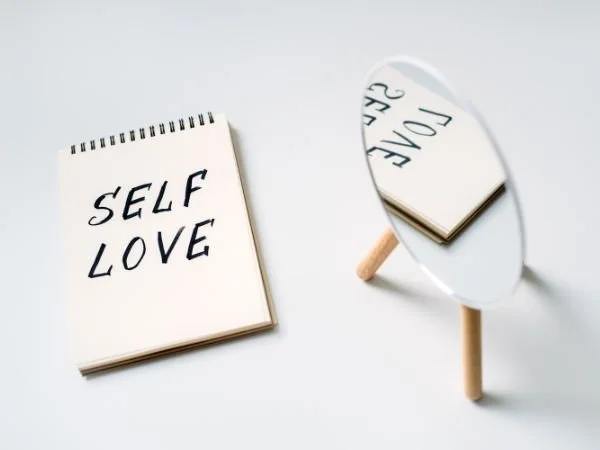48: 4 Steps for Letting Go of Expectations of Yourself and Others
Setting unrealistic expectations for yourself and others can lead to a repeating cycle of disappointment and frustration. In this episode, I outline my four-step process to help you release the pattern of unrealistic expectations so you can come back to the present moment and objectively re-evaluate your situation. Focusing on goal setting and setting realistic and attainable goals for yourself is one of the keys to unlocking your happiness.
This post contains affiliate links to some of my favorite tools and resources. As an Amazon Associate, I earn from qualifying purchases. Full terms & conditions here.
Timestamps ⏱️
0:00 Intro
2:45 Teaching
7:44 Step 1: Acknowledge & Bring Awareness
13:52 Step 2: Forgive yourself
16:35 Step 3: Reevaluate
20:49 Step 4: Practice Self-Compassion
Have you followed and left a review for New View Advice?
Let me know what you think of the podcast! Podcast followers and ratings help bring new listeners to the show, as well as help me to continue creating content. So if you enjoyed the show, I’d love to ask you to follow and leave a rating on your podcast platform by:
Head to New View Advice on Apple or Spotify
Click Follow on your podcasting platform
Scroll down (or when promoted) click the 5 star rating!
-
NOTE: This podcast was transcribed by an AI tool called Otter. Please forgive any typos or errors.
NOTE: Amanda Durocher is the only speaker in this episode of the podcast. This episode does not have any guests.
Amanda Durocher (Introduction) 0:00
Welcome to New View advice, a safe place for you to ask your most vulnerable questions about life, relationships, healing, and so much more. I'm your host, Amanda Durocher, and I believe our fears and traumas are often what holds us back from living life to the fullest. Join me here each week as I offer advice on how to move through whatever is holding you back from being your best self. Let's get started.
Hi, beautiful souls. This is New View Advice, and I am your host Amanda. If you're new here, this is a healing centered advice podcast where I offer advice for the healing journey. Today is a bit different than our usual episodes, I will not be answering listener questions today I will be outlining a four step process for letting go of expectations. So I find that on the healing journey, we can often set unrealistic expectations for ourselves. And in the moment, oftentimes, these expectations don't feel unrealistic. But as we go about our lives, and we go about our days, they become unrealistic. And I think that this can often happen because we compare ourselves to others. So I thought this was a great topic to discuss today. Because I don't know when you're listening to this, but I'm recording it January 2023, a few weeks after the new year, and for me, my new year hasn't gone as I expected, I wanted to be a new person this year. And the truth is, I actually feel a lot of changes within me because I did a lot of healing in the fall around the sexual assault trauma I've experienced. But with that said My New Year's resolution was to really take care of my body and my health and to eat better and all these things. And I actually spent the first two weeks of January traveling and moving. So I am currently recording this from sunny Florida, where I am currently living Previous to this, I was living in Arizona, and I was looking for a change of pace. So we found ourselves in Florida. And I am so surprised by how much I love it here. It feels so divinely guided, it's actually exactly what I needed. I'm living in this small little beach town and it is so calming for my nervous system. I didn't realize how much I needed to get out of the city for a little bit. So I will be here for the next couple of weeks. Not sure how long I'll be here hoping it's longer than I currently have planned. But we will see. And because of this, I set some unrealistic expectations for myself, because what I've found is that I've had to continue to go back to the process I'm going to outline for you because my life hasn't been smooth. This new year I it's involved a lot of transition, and a lot of patience with myself because things were in flux Things were moving.
Amanda Durocher (Teaching) 2:40
And so today, I wanted to outline this process for you of letting go of expectations. And before I jump in, I also wanted to mention that for people who have experienced trauma, so for people who have listened to this podcast before, I am a survivor of sexual assault and rape, I was raped in my childhood and in my teens. And because of this, my body lived in fight or flight most of my life, I still am working on bringing my body out of fight or flight. So the truth is after you experience trauma, and this trauma could be any kind of trauma, your trauma does not have to be similar to mine, our bodies are different. So our bodies hold the trauma until we process it. And it can take years to fully process because our bodies will often only let us process one layer at a time. And so because of this, I have found that I've set many unrealistic expectations for myself, because I have compared myself to people who haven't experienced the amount of trauma that I have. And that's not a comparison thing as an I've experienced more than you. But I mentioned that because it's a way to be kind to yourself, if you are in the process of looking at the pain you have experienced. Because the truth is, a lot of times we bottle it up and we can function in the world. And then when we start to bring it to the surface to look at it can be hard to function in the world, which is a reason why we often don't look at it. But if you're listening to this podcast, my guess is you have begun looking at your trauma or the pain and the wounding from your life, either current circumstances or from your youth. And what I have found is that unfortunately, when you begin to look at this wounding this pain, this trauma, it takes a lot of energy, and that's okay, there's nothing wrong with that. But we're no longer able to show up in the world like a quote unquote normal person. Again, I don't know what a normal person is. I am so far from normal that I don't exactly know what that looks like. But what I do know is that I have fallen into unrealistic expectations of myself many times because I thought my life was supposed to look like everyone else's, and it was never going to look like everyone else's. And it also wasn't able to because my body needs more attention. It needs more rest. It needs more time to heal than other people.
All or than other people are doing right now. It's just that we are all different. And when we set expectations compared to anyone else, they oftentimes are unrealistic because we are all different people, we're all coming at life from a new place. We're all common at life from different circumstances, we've all experienced different levels of trauma, different levels of wounding, we're all in different places, right now, today, I'm having a great day tomorrow might not be so good, I don't know. And so because of this, consistency has been very difficult for me. And that is a expectation I have put on myself many times before. And I think that's true for many trauma survivors. So that's why I wanted to do this episode one, because I needed this reminder this month. And two, I'm hoping that it helps someone else out there who struggles with the expectations they set for themselves. And I also want to say that throughout this I'm going to give an example also have setting expectations in relationships. I think that it's a very common thing as well, to put expectations on other people. And this process of letting go expectations can help for expectations you've set for yourself and also for a partner or for a friend or in a relationship because the truth is we cannot control other people. So we are very often disappointed by the expectations we put on others. So it's important for us to continually learn again and again how to let go of the expectations we set for ourselves and for others in order to come back to where we are in the present moment. And the last thing I want to mention before we jump in is that many people can get stuck in the cycle of setting an unrealistic expectation. And then self punishing, setting an unrealistic expectation, then self punishing, and this self punishing looks like being critical of yourself being judgmental of yourself having negative self talk around the expectation you set. And I want you to start becoming aware in your life where you may be setting an unrealistic expectation, and then punishing yourself for not meeting that expectation or punishing someone else for not meeting your expectation, even though they're an entirely different person who may not even know what expectation you have of them. So this is an important cycle to become aware of. And this four step process will help you to start breaking that cycle. Because the truth is criticism, judgment and negative talk do not help us to heal. They keep us imprisoned in the past. And by working with this four step cycle, I hope that you can become more free and able to live in the present moment or true freedom and liberation live. So with that, let's jump into today's episode about four steps to letting go of expectations of yourself and others.
Amanda Durocher (Four Step Process for Letting Go of Expectations - Step 1: Acknowledge & Bring Awareness) 7:43
Okay, so here is my four step process for letting go of expectations of yourself and others. Step one is to acknowledge and bring awareness. Step two is to forgive yourself. Step three is to reevaluate. And step four is to practice self compassion. So I'm going to break each of these down. So let's start with step one, acknowledge and bring awareness. So the first step of letting go of expectations is to acknowledge that you have set an unrealistic expectation or an expectation that you're not meeting for yourself or for someone else, and to bring awareness to it. So for example, some of the expectations I've set for myself may not seem unrealistic to the outside world, but they were unrealistic for me because of where I'm at in my life. And where I'm at in my healing journey. Like I mentioned in the intro, everyone is different, so we can't base our own lives off of others. So in step one is where you acknowledge that you've set this unrealistic expectation, the first step of really anything is to acknowledge that there is a problem, or there's something that needs to change. And then this is also where you're going to want to bring awareness to it. So start becoming curious, not judgmental, not critical of yourself, but curious about why you set this expectation. Was this your expectation? Or was this a societal expectation? Or was this an expectation that somebody put on you, a friend, a family member, or a partner, but you want to start becoming aware of why you set this expectation and where it originated from. So a great sign of expectations that are not serving you is to start to look at all the places in your life where you're saying, I should be doing this, or I should have done that. My therapist once told me that the word should is one of the most dangerous words in the English language. And I agree because it's the way we punish ourselves. Every time you tell yourself, you should have done something and create negative or critical dialogue around the should that to me is a form of self punishment. So if you're unaware of where these unrealistic expectations may be, or these expectations that are not serving, you begin to pay attention to how many times you tell yourself you quote unquote, should be doing something throughout the day really pay attention to where you are saying you should because oftentimes, the shoulda thought patterns are a way that we are, as I mentioned, self punishing and being critical of love ourselves.
So I'm going to walk through two examples from my own life ones an expectation I put on myself. And once an expectation I put on my partner. So for the expectation I put on myself, this is one that I was really looking at this fall. And an expectation I put on myself is how much I should work throughout a day and having unrealistic deadlines for myself and my business. The truth is healing from trauma, really any trauma. But for me, specifically, looking at rape this fall was a full time job in and of itself. But yet, I was still expecting myself to show up 40 hours a week to my business. And that wasn't serving me because I kept punishing myself because I wasn't able to meet those deadlines, because I was so deep in the healing. And to be honest, a 40 hour work week has just never been realistic. For me. It's just not my process. It's not how my body flows. And I'm not sure I'll ever meet that standard I set for myself. But for me, in order to balance my nervous system in order to heal in order to create space for what needs to arise in the moment, I can't work a 40 hour workweek. And for me what was actually really healing and where I was able to acknowledge this unrealistic expectation I set for myself and to start to bring awareness to this expectation for myself was that I began attending a sexual assault group in Arizona in the fall, and no one had a full time job. Everyone I met was working part time or didn't work. And some people had had full time jobs in the past, but they had recently been retriggered about their assault. And they found themselves working part time. And seeing this allowed me to bring kindness to myself and become more curious about why I was setting unrealistic expectations for myself. And it really brought awareness for me that there was nothing wrong with me that I couldn't work 40 hours a week, it was a side effect of the trauma of experience, and beginning to look at it and heal it. So in my early 20s, I was still in denial of everything I had survived, I actually had buried it so deep that I disassociated. So I wasn't even aware of what I had survived. So I was working a 40 hour job, I didn't like it, but doesn't matter, I was able to do it. And so I mentioned that because you might find in your life that in the past, you were able to do things that you're not able to do now. And that's because as we're healing, it uses energy. So if you're not healing, you may be able to show up in the world differently. But when we begin healing, it takes energy, it takes time. So your life is going to look different than it did prior to healing. And that's okay. So for me, that was one example of where I was able to acknowledge and bring awareness to an unrealistic expectation I was setting for myself. The second example is that years and years ago, I had set the expectation on my partner to propose to me by a certain date, I'd given them an ultimatum, super unhealthy. I see that now. And he didn't propose by that date. Spoiler alert, we're still not married, so you can see how the story goes. And when he didn't propose by that date, I had to acknowledge that I had set an expectation that wasn't going to be met. And I had to bring awareness and really look at why did I set this unrealistic expectation? Why did I need to be married. And through this awareness process, I was really able to see that I thought marriage was going to give me something. And the truth was, it wasn't. And so through the awareness process, I was able to see that I was taking on a lot of expectations from society, from friends from family, that my relationship was expected to look a certain way. And so through this awareness process, I was able to see that a lot of these expectations I was putting on my partner were because people were putting expectations on me. So that was the first step. So step two, is to forgive yourself. Many times when we create expectations, we're in a different place than where we are now. And a part of releasing and letting go of expectations is to acknowledge that we are human, and that life doesn't always go the way we want it to.
Amanda Durocher (Step 2: Forgive yourself) 13:48
So after we bring awareness, it's important to forgive ourselves. We forgive ourselves by feeling any feelings attached to the expectations and then allowing ourselves to be human. Many times I write in my journal about why I created the expectation and through awareness and acknowledgement, I'm able to forgive myself. Also for many of these expectations, it involves a period of allowing myself to grieve this expectation. So that could take a day that could take an hour or maybe it takes a week or longer. It's all about allowing yourself to grieve and fully feel the feelings attached to the expectation you put on yourself. Many of these unrealistic expectations are part of a fantasy that we've created, and are not grounded in reality. And sometimes we have to grieve that fantasy because we begin to almost start living in the future and living the life that we think we're going to have. And when we realize it's not going that way. We have to allow ourselves to grieve in order to come back to the present moment. And I've found that forgiveness comes naturally after we allow ourselves to see the truth of who we are and what we have experienced. Allowing ourselves to see ourselves fully brings forgiveness. And many times once we bring awareness it's also easy to forgive ourselves because we were able to see that the expectations we set may have been from a good intentioned place but are not working for us. And in order to move forward, we need to let them go. So to return to the two examples I was giving for the expectation I set for myself. When it came to forgiving myself for expecting myself to work more and harder, I was able to forgive myself when I began to see the truth of my life rather than the fantasy I wish I lived. A part of me wanted to look like a quote unquote normal worker who works 40 hours a week, because I believe that meant something or was the only way to success or I thought that other people would see my business more fully or see me more fully. If I was showing up in the way they expected me to or that society expected me too. But by allowing myself to grieve and feel the feelings that were there around what it looked like to work, I was able to forgive myself for trying to meet an impossible standard that was never created for someone like me, I also believe most creatives and I consider myself a creative creatives don't fit a nine to five mold, so I shouldn't try to fit in that either. And for my second example, about the expectation I put on Evan to propose my partner, I was able to forgive myself after I grieved what I thought my relationship was supposed to be like. So I spent a lot of time and a lot of time in therapy at the time, I had a tough love therapist who always told me what I needed to hear, but definitely didn't sugarcoat anything. And through that, I was able to see why I had created the expectation to be married. And I was able to fully grieve this fantasy I created for myself, I thought my life was gonna look a certain way. And the truth was, by releasing that I was able to come back to the present where life truly is. And that's a process that I've done again, and again, step three, is to re evaluate.
Amanda Durocher (Step 3: Re-evaluate Your Expectations)16:35
After you forgive yourself, you'll now have a new lens to view this expectation. So you'll now have a new perspective. And you'll be able to ask yourself, if this is an expectation you need to fully let go of, or is this an expectation that needs to be adjusted and reevaluated if you decide to adjust the expectation of yourself, then I invite you to also create healthy and self loving language around this behavior. So it feels more like a choice than like an expectation. So after you go through this process, I invite you to find a way to not say you shouldn't be doing things if that's a pattern you're working to get out of. So say your expectation you set for yourself was that you're going to exercise every day. And after you realize that was unrealistic for yourself, after you forgave yourself, when you're reevaluating, you probably don't want to give up exercising altogether. So you're going to adjust this expectation for yourself. And so I invite you to really reevaluate and think about how many days a week can you exercise, or maybe it's a monthly goal rather than a weekly goal. Or maybe you just start really slow, and you went from everyday to one day a week, but it's reevaluating, and coming up with likely a smaller goal for yourself. A lot of times, many of us set too big of goals for ourselves, and to create consistency. It's not about perfection. And it's not about going really hard really quick. It's about creating small steps, where you can meet those, and then you're able to build on that over time. So for me in my own life, when I expected myself to work 40 hours a week, every week and perform perfectly while healing, I constantly punished myself with the shoulds. And when I finally looked at this, and I forgave myself for this expectation, I realized it wasn't that I needed to give up all responsibilities, I just needed to create softer goals so that I wasn't constantly punishing myself. And I also had to understand that there were going to be periods where I just couldn't work. And that was just going to have to be okay. And I was going to have to trust something bigger than myself that my business wouldn't fall apart if I wasn't able to show up to work, because my body was asking me to heal, especially over these past couple months. And that was my number one priority. And I had to trust that what my heart was asking me to do was more important than what my mind thought I should do. So when I was reevaluating the goal, I really had to lean into that trust of what my heart was telling me. My heart was telling me I needed to heal. My heart was telling me that was our number one, our numero uno. My heart is also what led me to creating this podcast. So I had to trust that my heart knew the roadmap better than I did. And so in the reevaluating stage is when we can really lean into that trust and ask our hearts, what is actually in our best interest, not ask our minds, but really sit with ourselves and sit with our heart and see what our heart is communicating with us. And in my second example of putting the expectation on Evan for the proposal, I had to realize I can't control of him and I had to reevaluate what did I actually want to leave the relationship? Or did I want to work for the relationship I wanted without a ring on my finger. I chose option two and and I really began working on our communication and on boundaries and on communicating about our needs and what made us feel loved and what didn't and communicating about our traumas and how that was playing roles in our relationships. And that brought me the relationship I wanted and I don't feel the need to get married because I don't think it would change much about my relationship because I followed my heart, my heart was like don't leave Evan just work on your relationship. That's also my tough love therapist told me at the time. And she was right. And in that reevaluation stage, that's what I reevaluated about both my circumstances. But reevaluating is going to be different for everybody, you may be in a similar situation to mine, and get an entirely different answer. And that's okay. Because in that reevaluation stage, it's really about sitting with your heart. And it's about figuring out what's best for you, and not comparing yourself to others. It's about dropping back into your body and into your heart. And we're able to do that after we bring the awareness and we forgive ourselves, then we're able to really become aligned and bring clarity to what we really need. And I also want to mention that as we move through these three steps, so the first three steps of this process, we may need to go back and do it again.
Amanda Durocher (Step 4: Practice Self-Compassion) 20:47
And again, which leads to step four, which is self compassion. And so as you move through the process of letting go of expectations, you want to practice self compassion. Because by being kinder to yourself, you'll be able to adjust your life and forgive yourself quicker, you'll also begin to set less and less expectations for yourself that leave you feeling defeated and disappointed. Self Compassion is the practice of recognizing that you're human. And in that it inherently means you are not perfect, we are not the same every day things happen. And through self compassion, we're able to learn to be kinder to ourselves by not punishing ourselves judging ourselves, or negatively speaking to ourselves, but instead by beginning to understand ourselves and be kind to ourselves. And a great way to start self compassion is to think about the way you talk to yourself and ask if you would be that hard on a loving friend or family member or your partner, many of us our own biggest critics and bullies. And this often stems from being criticized and bullied in the past. So many people live with self criticism and self judgment, because we learned when we were young, that if we beat people to the punch, so if we criticize ourselves first, that it wouldn't hurt so much when people criticize us. And also, sometimes we internalize this criticism, fathers are this bullying of others to such an extent, we began to truly believe it about ourselves. So we tell ourselves negative things are critical things because we truly believe that about ourselves. And we begin to believe that we're inherently flawed or not enough and unworthy. So the process of healing is peeling back those layers and seeing that that was never true, that that is not true now. And it was not true then either. So through self compassion, we begin to practice the self love and kindness that we have always deserved, and that we deserve. Now, in my own life, I've been incredibly hard on myself. And it's only through self compassion, that I've been able to create a healthy loving and safe relationship with myself. So for both these examples, I've given self compassion greatly assisted me in the process of letting go of expectations is a critical component to the process. And so I have self compassion as the fourth step. But really, self compassion comes in at every step. And it's the fourth step because it's a reminder to continue to be kind to yourself as you release and let go of this expectation, because for the examples I gave, self compassion greatly assisted me because I wasn't able to let go of these expectations overnight. It took time and effort because these were so ingrained in me that I was telling myself I should on such a deep level, I should get married, and I should be working more. And through this self compassion. And by continually being kind to myself throughout the process, I was able to free myself of these expectations, and now to create a life that works for me and brings me happiness and joy.
Amanda Durocher (Outro) 23:35
Thank you for listening to this episode about letting go of expectations of ourselves and others. I hope you found something helpful and something resonated with you throughout this episode. I wanted to mention before we wrap up, if you're interested, I'm now offering one on one sessions. And these sessions are designed to assist you on your healing journey. I know how lonely and difficult healing can be. So these sessions are an opportunity to work with me one on one, I assist you in connecting back to yourself. And each session is catered to your needs and uses a variety of modalities. And we're always working on connecting you back to your heart because I believe you have the answers. So we'll do things like talk or use guided visualizations or journaling to assist you in getting to the source of your problem and connecting back to yourself. So if you're interested in working with me one on one you can learn more at NewViewadvice.com/advice sessions or you can send me an email at NewViewadvice@gmail.com Thank you again for joining me for another episode of New View Advice. As always, I hope I was able to offer you a new view on whatever you may be moving through. sending you all my love. See you next time.
Transcribed by https://otter.ai



































